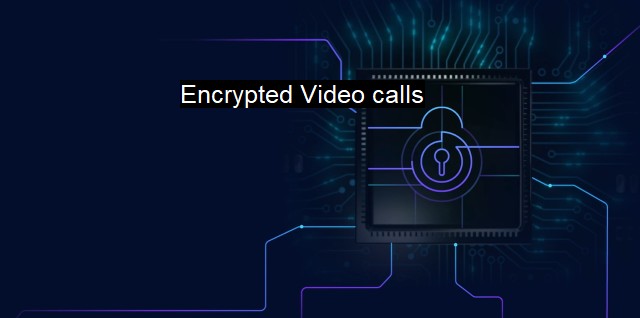What are Encrypted Video calls?
Protecting Video Calls: The Importance of Encryption in Securing Remote Collaboration During COVID-19
Encrypted video calls are a cutting-edge technology designed to offer secure and private communication solutions. Nowadays, when almost everything becomes digitalized, every click, swipe, or tap we make online leaves a digital footprint that can be exploited by malicious entities. This particularly applies to the realm of online communication, where our invaluable personal data, including sensitive videos and audio, can be severely exploited if not properly protected. This is where encrypted video calls join the combat, providing secure, inviolable, and private communication channels.Encrypted video calls are the product of cryptography. They employ robust cryptographic algorithms to convert our communicative content, both video and audio, into complex codes that cannot be deciphered without decompression keys. Only the sender and the legitimate receiver possess these keys, ensuring that the video calls cannot be mishandled or decoded by hackers, cybercriminals, or any unauthorized entities.
Encrypting video calls involves two critical encryption types in communicating the data securely. These are the end-to-end encryption and transport layer encryption methods.
End-to-end encryption implies that the data is encrypted from one end, i.e., the point of origination, and can only be decrypted at the other end, the recipient's point. This end-to-end encryption method locks the data in such a way that even the servers and interfaces transporting the data do not have the access to its content. Only the recipients armed with the unique decryption key can decipher the call content.
On the other hand, transport layer encryption secures the path that the data takes to and from endpoints. This path is referred to as the transmission pipeline, and its encryption ensures that the data cannot be intercepted during the journey. Unlike end-to-end encryption, transport layer security (TLS) allows servers to access the call data, which can become a potential security risk if the servers are compromised.
Cybersecurity does not stop with securing communication. The use of antivirus applications has become an integral part of protective measures in the world of technology. An updated, efficient antivirus application arms systems with strong shields that recognize and incapacitate intrusive software that tries to barge in.
In the context of encrypted video calls, antiviruses triple-check the downloaded applications, keep our operating systems bug-free, and closely monitor our online activities. This vigilant scanning significantly reduces the likelihood of security breaches that would allow intruders to access our private keys and therefore our encrypted communication channels.
In general, viruses can be used to infiltrate systems and eavesdrop on communication data. This constitutes one of the foremost reasons why antiviruses and implementation of video call encryption work hand in hand. Constant antivirus scanning supplements the encryption by preventing entry points that might be exploited to compromise the video call data.
Just like the gates to a city, the antivirus guards our portals of sensitive data, checking every visitor for malicious intent. Linked with the walls of encryption, these two cybersecurity measures form an almost impervious protective layer, deterring cyber threats and ensuring safe, private communication.
Inferring from the above, encrypting video calls, combined with potent antivirus programs, provides an optimal level of security. This secure layer around our communications is increasingly important in the interconnected world where the severity of cyber threats and attacks increases almost exponentially. Therefore, sound knowledge and implementation of encrypted video calls under the umbrella of robust cybersecurity practices become an indispensable necessity in the modern world of digital communication.

Encrypted Video calls FAQs
What are encrypted video calls and how do they work?
Encrypted video calls refer to video calls that are secured with encryption keys. Encryption is a technique that scrambles the data during transmission, making it difficult for hackers to intercept and decipher the information. Encrypted video calls work by using encryption keys to encode the data while it is transmitted over the internet.Are encrypted video calls more secure than regular video calls?
Yes, encrypted video calls are much more secure than regular video calls. Encrypted video calls use encryption techniques to secure the data during transmission, making it difficult for hackers to intercept and decipher the information. On the other hand, regular video calls do not use encryption techniques, which means that the data is vulnerable to interception and hacking.What are the benefits of using encrypted video calls?
Encrypted video calls offer many benefits in terms of security and privacy. Some of the benefits include: 1. Secure transmission of sensitive information during the call 2. Protection against interception and hacking 3. Increased privacy and confidentiality 4. Better compliance with data protection regulations 5. Reduced risk of cyber threats and viruses.Which antivirus softwares can I use to secure my encrypted video calls?
There is no specific antivirus software that is designed to secure encrypted video calls. However, there are antivirus solutions that provide comprehensive protection against cyber threats and viruses. Some of the top antivirus software providers include Norton, Kaspersky, McAfee, Bitdefender, and Avast. It is essential to choose an antivirus software that offers real-time protection and frequent updates to ensure maximum security.| | A | | | B | | | C | | | D | | | E | | | F | | | G | | | H | | | I | | | J | | | K | | | L | | | M | |
| | N | | | O | | | P | | | Q | | | R | | | S | | | T | | | U | | | V | | | W | | | X | | | Y | | | Z | |
| | 1 | | | 2 | | | 3 | | | 4 | | | 7 | | | 8 | | |||||||